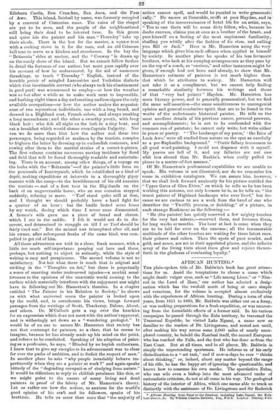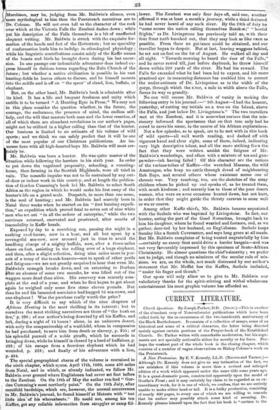AFRICAN HUNTING.*
THE plain-spoken title of Mr. Baldwin's book has great attrac- tions for us. Amid the temptations to choose a name whick might dazzle vulgar eyes, such as "Life among Lions," or " Nim • rod in the Land of Ham," our author has selected a desig- nation which has the twofold merit of being at once simple and veracious, for the volume is occupied almost exclusively with the experiences of African hunting. Daring a term of nine years, from 1851 to 1860, Mr. Baldwin was either out on a foray, or was making preparations for a fresh expedition, or was recover- ing from the formidable effects of a former raid. In his various. campaigns he passed through the Zulu territory, he traversed the Transvaal Republic, he visited Lake Ngami, a name now so familiar to the readers of Dr. Livingstone, and rested not until, after making his way across some 2,000 miles of nearly unex- plored country, he beheld the Zambesi itself, the second European who has reached the Falls, and the first who has done so from the East Coast. But at all times, and in all places, Mr. Baldwin is. simply the unpretending sportsman. He informs us of his early disinclination to a "set task," and if now-a-days he ever "thinks. about thinking," or, indeed, about any matter beyond the range of his rifle, he has the happy art of ignoring the questionable, and knows how to consume his own smoke. The speculative Zulus, who can wile even a bishop into the most advanced ranks of rationalistic criticism, do not at all come in his way. The geological history of the interior of Africa, which one seems able to track so distinctly with the assistance of Dr. Livingstone and Sir Roderick African Hunting, from Natal to the Zambesi, including Lake Ngarai, the Kala- hari Desert, &c. By William Charles Baldwin, Esq., E.G.S. London : Bentley, liG3. urchison, may be, judging from Mr. Baldwin's silence, even ore mythological to him than the Pentateuch narratives are to Dr. Coleus°. He will not even tell us the character of the rock I over which at the Victoria Falls the Zambesi dashes down ; while yet his description of the Falls themselves is a bit of unaffected eloquent writing. Mr. Baldwin is struck with the exquisite for- mation of the hands and feet of the Hottentots ; but no speciality of conformation leads him to indulge in ethnological physiology ; while his linguistic contributions consist solely of the Kaffir names of the beasts and birds he brought down during his last excur- sion. In one passage our indomitable adventurer does indeed ex- pr ess himself in dubious terms regarding the Zulu Church of the future; but whether a native civilization is possible in his vast hunting-fields he leaves others to discuss, and he himself mounts
' into the saddle and is off on "the spoor" of eland, lion, buffalo, or elephant.
But, on the other hand, Mr. Baldwin's book is admirable after its kind. It has a life and buoyant freshness and unity which entitle it to be termed "A Hunting Epic in Prose." We may not in this place consider the question whether, in the future, the courage, the endurance, the presence of mind, the endless self- help, and the will that masters both man and the lower creation, of all of which there are abundant revelations in our author's pages, might not be utilized in a higher calling than that of the hunter. Our business is limited to an estimate of his volume of wild .] sports ; and we think we can safely predict that it will be one of the most popular of our Christmas publications. An im- mense hero with all high-hearted boys Mr. Baldwin will most cer-
tiainly be. Mr. Baldwin was born a hunter. He was quite master of the tuation while following the harriers in his sixth year. In order to put down the vagabond propensity, schooling, a counting- house, then farming in the Scottish Highlands, were all tried in vain. The nomadic impulse was not to be restrained by any out- of-door or indoor work in this country, and at length the publica- tion of Gordon Cumming's book led Mr. Baldwin to select South Africa as the region in which he would make his first essay of the hunter's life on a grand scale. Despatch, in more than one sense, is the soul of hunting ; and Mr. Baldwin had scarcely been in Natal three weeks when he started on his "first hunting expedi- tion," an expedition which proved fatal to seven out of nine white 'men who set out "in all the ardour of enterprise," while the two , survivors returned, enervated and prostrated, after months of insensibility in Kaffir kraals.
' Exposed by day to a scorching sun, passing the night in a soaking read-house, now in a boat, and all but upset by a revengeful sea-cow, now aroused just in time to avoid the headlong charge of a mighty buffalo, now, after a three-miles chase on foot, assisting in the rolling over of a huge elephant, and then, after a slight refection, doing nine miles more in pur- suit of a troop of the trunk-bearers--not to speak of other perils and fatigues—we are not greatly surprised to hear that even Mr. Baldwin's strength breaks down, and on returning to Durban idler an absence of some two months, he was lifted out of the ■ waggon more dead than alive. His recovery was scarcely com- plete at the end of a year, and when he first began to get about again Ile weighed only some five stone eleven pounds. But then he and his lamented associates had bagged 55 sea-cows, and one elephant ! Was the purchase really worth the price?
It is very difficult to say which of the nine chapters of African Hunting is the most thrilling in its interest; but to ourselves the most striking narratives are those of " the bush on fire," p. 296; of our author's being deserted by all his Kaffirs, and left, during a night of 14 hours ! alone, in an unknown desert, with only the companionship of a waifchild, whom in compassion he had purchased, to save him from death or slavery, p. 255; of his splendid pursuit of a noble giraffe, which he succeeds in bringing down, while he himself is chased by a herd of buffaloes, p. 223; of his escape from a ferocious elephant which he had wounded, p. 213; and finally of his adventure with a lion, p. 424.
The special geographical charm of the volume is contained in the ninth chapter, which opens, April 17th, 1860, some 450 miles from Natal, and in which, as already indicated, we follow Mr. Baldwin over ground where Englishmen had never set foot before to the Zambesi. On the 18th of May the author rea:hed " Gor- don Cumming's most northerly point." On the 19th July, after manifold hardships, which are, however, the normal occurrences in Mr. Baldwin's journal, he found himself at Mateste with "but little idea - of his whereabouts." He could not, among his ten Kaffirs, get any reliable information front straggler or camp fol- lower. The Zambesi was only four days off, said one another affirmed it was at least a month's journey, while a third declared
he had never heard of any such river. By the 24th of July he "came across the nation calling themselves Batokas ;" "horrid frights," as Dr. Livingstone has previously told us, with their four front teeth knocked out, that they may look as like oxen as possible. From these no guidance could be obtained, and our traveller began to despair. But at last, leaving waggons behind,
he set out on foot on the 1st of August. He walked all day and all night. "Towards morning he heard the ioar of the Falls," and he never rested till, just before daybreak, he threw himself down within 300 yards of the river. He had his reward. The
Falls far exceeded what he had been led to expect, and his more practised eye in measuring distances has enabled him to correct the under-estimate of Dr. Livingstone as to the width of the gorge, through which the river, a mile in width above the Falls, forces its way so grandly.
No one will accuse Mr. Baldwin of vanity in making the following entry in his journal :—" 9th August—I had the honour,
yesterday, of cutting my initials on a tree on the Island, above the Falls, and just below Dr. Livingstone's." The two travellers met at the Zambesi, and it is somewhat curious that the mis- sionary informed the sportsman that on that tree only had be- cared to carve his name, in the course of his African explorations. Not a few episodes, so to speak, are to be met with in this book of wild sports—all well worth reading, and dashed off with vigorous band and clear sight, some of them, indeed, indicating very high descriptive talent, and all the more striking from the fact that they were written amidst the fatigues of Mr.
Baldwin's wanderings, and often with a mixture of tea and gun- powder—ink having failed I Of this character are the notices of the various tribes of Kaffirs—the wretched Masaras, the wild Amatongas, who keep no cattle through dread of neighbouring Rob Roys, and several others whose existence seems one of chronic war. Very touching, too, are the sketches of the stray children whom he picked up and speak a of, as he treated them, with much kindness ; and scarcely less to those of the poor desert women, who were on some occasions hunted down, but not hurt, in order that they might guide the thirsty caravan to some well or water course.
Among other Kaffir chiefs, Mr. Baldwin became acquainted with the Sechele who was baptized by Livingstone. In fact, our
hunter, acting the part of the Good Samaritan, brought back to- him his daughter, whom he found wearied and footsore, and, as we gather, deserted by her husband, an Englishman. Sechele keeps Sunday like a Scotch Covenanter, and says long grace at all meals.
But Mr. Baldwin complains of being treated ungratefully by him —certainly no canny Scot could drive a harder bargain—and was- not very favourably impressed by this specimen of Scoto-African Christianity. He almost questions the chief's sincerity ; we prefer not to judge, and though no admirers of the secular rule of mis- sions, we are, on the whole, not much distressed by our author's statement that Mr. Moffat has the Kaffirs, Sechele included, "under his finger and thumb."
Our space will only allow us to give to Mr. Baldwin our- valedictory thanks for the spirit-stirring and withal wholesome entertainment his most graphic volume has afforded us.





























































 Previous page
Previous page